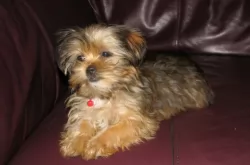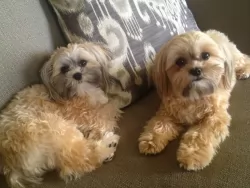 MyDogBreeds
MyDogBreeds Shorkie is originated from United States but Border Terrier is originated from United Kingdom. Shorkie may grow 16 cm / 6 inches shorter than Border Terrier. Both Shorkie and Border Terrier are of same weight. Both Shorkie and Border Terrier has same life span. Shorkie may have less litter size than Border Terrier. Both Shorkie and Border Terrier requires Moderate maintenance.
Shorkie is originated from United States but Border Terrier is originated from United Kingdom. Shorkie may grow 16 cm / 6 inches shorter than Border Terrier. Both Shorkie and Border Terrier are of same weight. Both Shorkie and Border Terrier has same life span. Shorkie may have less litter size than Border Terrier. Both Shorkie and Border Terrier requires Moderate maintenance.
 The Shorkie is a mix between a Yorkshire Terrier and a Shih Tzu. This little dog actually thinks he’s quite big. He is a great watchdog and a barker, and he is a loyal and loving member of his family. He will let you know if he thinks something is going on that shouldn’t be.
The Shorkie is a mix between a Yorkshire Terrier and a Shih Tzu. This little dog actually thinks he’s quite big. He is a great watchdog and a barker, and he is a loyal and loving member of his family. He will let you know if he thinks something is going on that shouldn’t be.
This hybrid combines two breeds known for their good looks, cuteness and personalities. Shorkies get their watchdog instincts and their loyalty to their people from the Shih Tzu and their personalities and good looks from the Yorkie. This designer breed has no known standard and every puppy is different, but traits from its founding breeds will remain. Both breeds have great personalities.
Regardless of the differences within the litter, because the personalities and adorableness of the two founding breeds are equal, all of the puppies will have those characteristics. They will all be energetic, playful and think they are big dogs. They will all love people and especially kids – playing and watching over them.
The Shorkie is intelligent, trainable, and snuggly. They will also have the stubborn trait that the two founding breeds can show at times. Developed in the United States, this crossbreed is extremely popular even though they have been in existence for only ten years or so. Breeders in the U.S. began to mix these two breeds in order to develop a cute, friendly and intelligent little dog that will cuddle on your lap – perfect lap dog.
Even if we already have breeds similar to the Shorkie, its development allows breeders to diversify and improve the genetics of the dogs. It is important that these be responsible breeders whose intentions are not financial but to legitimately improve the positive traits of each breed while sorting out the undesirable or weak traits. This is the positive side of the new designer breeds.
Even though it is still being developed, at least the Shorkie seems to be a success story for designer breeds as a loving, popular little dog. It will take a lot more time and a lot more development before the Shorkie becomes an actual recognized breed. At the moment it remains a hybrid, a crossbreed, a so called designer dog.
It will be at least 7-10 generations of careful and quality breeding before the Shorkies are potentially recognized as its own pedigree breed. It is important to breed Shorkies to Shorkies in order to develop a standard that could be accepted for a new breed by the AKC and UKC. Over time the puppies must become more and more standardized in their conformity to that new breed standard. Their physical appearance and their temperament will be standardized. At this stage the second generation of Shorkies is rare. Their popularity is rising in the United Kingdom. Both Britain and Ireland have a growing interest in this hybrid.
 As a working dog, the Border Terrier comes from the border country between England and Scotland. To be more specific, the dog originates from the rough hill country in the areas on both sides of the border between England and Scotland – an area known as 'The Border Country'. The breed was developed by the farmers, using the Terriers to help contain the fox population.
As a working dog, the Border Terrier comes from the border country between England and Scotland. To be more specific, the dog originates from the rough hill country in the areas on both sides of the border between England and Scotland – an area known as 'The Border Country'. The breed was developed by the farmers, using the Terriers to help contain the fox population.
It is believed that they are related to other kinds of terriers which also came from this region such as the Bedlington- and Dandie Dinmont Terriers. The first Border Terrier was registered in 1913 with the British Kennel Club. Later, the Border Terrier Club was also formed. A club for these dogs was also registered in the United States in 1930.
 The Shorkie, being a cross between the Yorkshire Terrier and the Shih Tzu, and as such has physical and temperament characteristics from both breeds. They could be 50-50 but most likely each puppy will be more like one of the founding parents than the other. Because there is a lot of similarity between the founding breeds there is a lot of similarity between the Shorkies.
The Shorkie, being a cross between the Yorkshire Terrier and the Shih Tzu, and as such has physical and temperament characteristics from both breeds. They could be 50-50 but most likely each puppy will be more like one of the founding parents than the other. Because there is a lot of similarity between the founding breeds there is a lot of similarity between the Shorkies.
Their hair is either wavy or straight, but it is soft. It can be a wide variety of colors and usually they have a darker mask on the face. Usually they have the eyes of the Shih Tzu – large -but not protruding. Their muzzle is short, and the skull is round with triangle ears. Their bodies are compact, small with plenty of muscle for their size. They also have fine bones and short legs, with a thin curled tail.
 The Border Terrier is a small to medium sized dog, weighing roughly between 5- and 7kg and standing at anything between 28 and 40cm in height. With his dark brown eyes and keen, alert expression, and with ears dropping forward, people describe the head as being like that of an otter. He is a courageous worker and a loyal companion but some people may not take kindly to him wanting to dig under-, or climb over barriers to get out to follow a scent or to go exploring.
The Border Terrier is a small to medium sized dog, weighing roughly between 5- and 7kg and standing at anything between 28 and 40cm in height. With his dark brown eyes and keen, alert expression, and with ears dropping forward, people describe the head as being like that of an otter. He is a courageous worker and a loyal companion but some people may not take kindly to him wanting to dig under-, or climb over barriers to get out to follow a scent or to go exploring.
The Border Terrier is a rough coated dogs of medium size with narrow build. The dog’s height is slightly greater than the dog’s length. The coat can be tan and black or dark grey. Sometimes the coat is described as grizzle - dark tipped hairs which give an overlay of color to the tan or red coat. You can also possibly find some white on the muzzle or chest. He has a double coat, with the outer coat being short, dense and wiry. The tail is of medium length and the ears drop forward toward their cheeks.
 A Border Terrier is a dog that has to be part of the family. You can’t just stick him in your back yard as he will just pine away with unhappiness. Boredom and loneliness will cause him to bark and he has a loud bark. He’ll become destructive – characteristics that aren’t his fault because he didn’t ask to be bought and just stuck away.
A Border Terrier is a dog that has to be part of the family. You can’t just stick him in your back yard as he will just pine away with unhappiness. Boredom and loneliness will cause him to bark and he has a loud bark. He’ll become destructive – characteristics that aren’t his fault because he didn’t ask to be bought and just stuck away.
Train and socialize your Border Terrier so that he becomes the great dog he is intended to be. He gets on well will children who have been taught to be kind to animals and he will get along with other pets in the home. The Border Terrier is an affectionate, sensitive dog and once trained he is willing to obey your commands.
The Border Terrier isn’t the greatest guard dog but is best known for his loving, devoted and loyal nature. He loves his food, and if you feed him well, provide him with a warm, dry place to sleep and provide him with lots of attention and exercise, you’ll have the most devoted and loving friend for life.
 Many hybrids are in better health at least genetically than their parent breeds. Responsible breeders will breed any genetic issues out of their puppies. Still there are many health issues that the Shorkies are prone to. These include:
Many hybrids are in better health at least genetically than their parent breeds. Responsible breeders will breed any genetic issues out of their puppies. Still there are many health issues that the Shorkies are prone to. These include:
• Brachycephalic Airway Syndrome – “smashed face” causes problems with breathing, heat, flying and more.
• Glaucoma – Yorkshires have this, and it can be secondary to the lens Luxation.
 Border Terriers are a healthy breed and with good food and plenty of love and attention, they can reach 14 years of age. It is to be noted with this dog breed that he doesn’t show signs of pain or sickness easily so you want to watch him closely.
Border Terriers are a healthy breed and with good food and plenty of love and attention, they can reach 14 years of age. It is to be noted with this dog breed that he doesn’t show signs of pain or sickness easily so you want to watch him closely.
Canine Epileptoid Cramping Syndrome - This is a disease which can be evident from 7 months of age already. The disease was once known as Spike's Disease, and its an hereditary disease of Border Terrier dogs. The cause of the disease is unknown but it is similar to canine epilepsy. It is thought that a contributing factor can be gluten, so a gluten-free diet will be recommended.
Heart defects can also affect Border Terriers, one of which is pulmonic stenosis. This is a narrowing of the valve which separates the right chamber of the heart from the lungs. It can ultimately lead to arrhythmia to congestive heart failure. He’ll have difficulty with breathing, suffer from abdominal distension and won’t be able to exercise properly.
 1.Feeding the puppy - The Shorkies need a high-quality, well-balanced dry kibble. Make sure it is a formula for small, active dogs. It should have lean meat and essential minerals and vitamins. Make sure it is puppy food not adult. The puppy needs 300 -550 calories a day in 3 meals.
1.Feeding the puppy - The Shorkies need a high-quality, well-balanced dry kibble. Make sure it is a formula for small, active dogs. It should have lean meat and essential minerals and vitamins. Make sure it is puppy food not adult. The puppy needs 300 -550 calories a day in 3 meals.
2.Feeding the adult – Obesity is a problem for the Shorkie as it is for many small dogs. Don’t overfeed your adult but give her the same kind of high quality small breed dog food, only for adults. They need about 200-300 calories a day in 2 meals.
4. Games and Exercises – These are very active little dogs and need exercise every day. They needs walks, games, and time with you. They also love to cuddle with you at the end of the day. They love squeaky toys and playing fetch outside or inside.
 Because the topcoat of the Border Terrier is dense and harsh with a thick undercoat, he will require moderate grooming. He doesn’t shed too much. Brush your Border Terrier twice a week to remove dead hair and keep your dog’s coat healthy. As part of his grooming, keep his nails clipped as well as his teeth checked and brushed at least twice a week. Make use of specialized dog toothpaste and brush.
Because the topcoat of the Border Terrier is dense and harsh with a thick undercoat, he will require moderate grooming. He doesn’t shed too much. Brush your Border Terrier twice a week to remove dead hair and keep your dog’s coat healthy. As part of his grooming, keep his nails clipped as well as his teeth checked and brushed at least twice a week. Make use of specialized dog toothpaste and brush.
The Border Terrier can quickly put on weight so it is important to feed him according to the instructions on the packaging if you’re going to be feeding him with commercially manufactured dog food. Make sure its a quality brand and one which caters for his energy requirements.Dogs are individuals, and they don’t all eat the same amount. As a responsible dog owner, it is up to you to monitor your pet and understand his unique requirements.